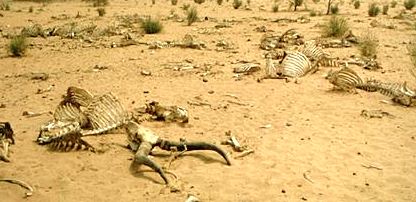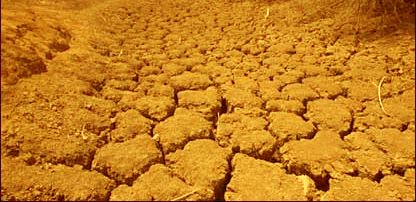 As reported in my April 2009 report people have, as the only available coping strategy, resorted to begging activities either by migrating to areas which harvested some crops in the last season or to towns. Many of the towns have been overwhelmed by families of beggars. In Asmara, the government has criminalized and prohibited begging activities and has carried out waves of rounding up, detaining and deporting the beggars to their respective villages. Those town dwelling beggars are only being released on bail of 10,000 on condition that they would not engage in begging activities again. However, as begging is not an activity of choice but a choice between death and survival people have to beg to survive or choose to die if they do not beg. Thus, the government has failed to stop people from begging – those who were warned not to beg and others continue to engage in begging activities, though the government is still engaged in continuous detaining and deporting of the beggars. The last rounding up of the beggars was on the 5th of July 2009.
As reported in my April 2009 report people have, as the only available coping strategy, resorted to begging activities either by migrating to areas which harvested some crops in the last season or to towns. Many of the towns have been overwhelmed by families of beggars. In Asmara, the government has criminalized and prohibited begging activities and has carried out waves of rounding up, detaining and deporting the beggars to their respective villages. Those town dwelling beggars are only being released on bail of 10,000 on condition that they would not engage in begging activities again. However, as begging is not an activity of choice but a choice between death and survival people have to beg to survive or choose to die if they do not beg. Thus, the government has failed to stop people from begging – those who were warned not to beg and others continue to engage in begging activities, though the government is still engaged in continuous detaining and deporting of the beggars. The last rounding up of the beggars was on the 5th of July 2009.
 Now it has become apparent that the situation is getting out of control: there is a real humanitarian crisis in the country. If not for the blocking of the people from crossing to the neighboring countries, people would leave the country in hundreds of thousands to save their lives. In general, the government is not responding to the famine and even if there are some responses in some areas, these responses to the crises are disappointing. The responses are large scale mass resettlement of the people suffering from hunger. As of last week of June 2009, the government is busy transporting thousands of households mainly from Debub and Anseba Regions to Gash – Barka- around Kachero (Omhajer), Gergef and Aligeder. What is more surprising is that the resettlement activities are taking place in unplanned and haste manner during the rainy season (June – September is the rainy season for most parts of Eritrea). During the rainy season it is not conducive to plan resettlement activities for the following reasons:
Now it has become apparent that the situation is getting out of control: there is a real humanitarian crisis in the country. If not for the blocking of the people from crossing to the neighboring countries, people would leave the country in hundreds of thousands to save their lives. In general, the government is not responding to the famine and even if there are some responses in some areas, these responses to the crises are disappointing. The responses are large scale mass resettlement of the people suffering from hunger. As of last week of June 2009, the government is busy transporting thousands of households mainly from Debub and Anseba Regions to Gash – Barka- around Kachero (Omhajer), Gergef and Aligeder. What is more surprising is that the resettlement activities are taking place in unplanned and haste manner during the rainy season (June – September is the rainy season for most parts of Eritrea). During the rainy season it is not conducive to plan resettlement activities for the following reasons:
· The rainy season is the period where people are supposed to cultivate their lands to produce their food for the coming year;
· The rainy season poses the problem of exposure of people to rain and dust storms, malaria and other diseases because it is the best time for pests’ and vectors’ reproduction and activities.
From this it is not difficult to see that the government is employing a development approach to managing an emergency situation and yet even the development approach is extremely poorly planned, organized and managed. The people are being dumped up in the wilderness with no social service facilities and provisions. So far thousands of households have been moved to these areas within the past two weeks and it is still continuing and it is not know when it will stop.
The government has made empty promises to the people that it will provide them with social services and food and cultivate for them land. The only support the resettled households have received is that the Military has provided transportation trucks and the government gave to each household 3000 Nakfa (which is according to the black market exchange rate about US $75 per household). The areas in which the settlers are settled are malaria areas and as these people come from non-malaria areas they have not developed resistance and tolerance to malaria. This makes the vulnerability to malaria very high; particularly children are the most vulnerable group.
With the exception of a negligible number of households who has received tents, neither shelter nor food has been provided to the settlers by the government. Thus households are being thrown in the wilderness in areas which are alien to them. Some water is supplied by water tankers but it is extremely in short supply (about 20 litres per household per day). Moreover, the populations inhabiting the surrounding areas are forced to contribute to food to provide for new settlers. As the result of the combinations of poor sanitation, hygiene, and lack of food and shelters, the settlers (particularly children) are suffering from:
· malnutrition
· outbreaks of different diseases such as malaria
· hot summer sun exposure
· exposure to rain and dust storms
· psychological stresses and depression.
Frustrated by this situation many households have attempted and continue attempt to cross to Sudan but have been prevented from leaving their camps by the military guards.
Generally this can be taken as an indication that with the current government approach to handling the humanitarian crisis the situation is set for the worst.
Completion of land redistributing in Gash Barka region
The land redistribution process in Gash Barka region which I reported in my April 2009 report has now been completed. According to this redistribution process, households have received smaller lands than what they used to hold before the redistribution. In areas such as Goluj, while the minimum land holding before the redistribution was 2 hectares per household, now the maximum holding is 1 hectare per household. Thus even without considering the big holdings, the small holders (2 hectares holdings) have lost half of their holdings. The most injustice that has been done is however, the exclusion of big proportion of the early settlers from benefiting from the redistribution programme. The early settlers of the area such as the Tigre, Nara and the Kunama ethnic groups are disappointed by, and opposed, the redistribution process and thus refused to register for the application for land as it is a requirement according to the redistribution process. The result is that their lands had been retaken but not being given new land. Furthermore, large proportion of those households who had no land holdings before the redistribution has not been given land due to shortage of land.
Putting of privately owned tractors under the direct military management
All privately owned tractors are put under the direct control and management of the military, i.e. their owners have been denied to exercise their property rights power to manage and control their tractors as the military has put them under guards at its garages. And it is not yet clear whether the military will pay the owners for the services of their tractors or not. The implication of this is that the government will give first priority to cultivating the military/government owned land and its supporters’. Moreover, this will result in inefficient use of the already scare availability of tractors that would lead to delays in cultivation or to leaving large proportion of crop land uncultivated this crop season in Gash Barka region – because Gash- Barka regions depends heavily on tractors for cultivating.
Related Articles:
Update on the Famine Crisis in Eritrea: the Landless and Beggars
III) Eritrea, a Nation in Overall Crisis: Coping Strategies in Hard Times
(II) Land Expropriation
(I) NGOs and food aid